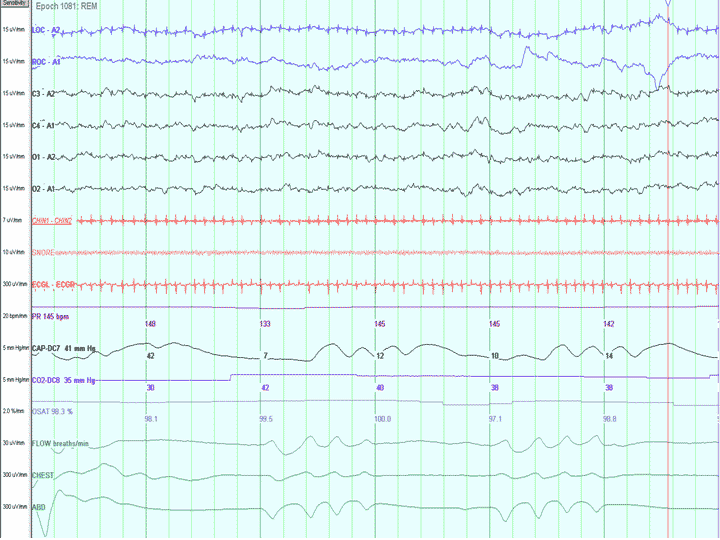Contributed by Haviva Veler, MD and Raanan Arens, MD
A 2 month old infant observed by parents to stop breathing during sleep. The infant underwent a PSG in the hospital, a 30 second epoch is presented. What is the diagnosis?
Periodic breathing in the newborn
Discussion
- Periodic breathing is characterized by 3 or more episodes of central apneas, each lasting longer than 3 seconds, and separated by continuous respiration of less than 20 seconds. There may or may not be significant desaturations with the events.
- Periodic breathing is considered a benign condition in infants and frequently observed in preterm infants. It is not a precursor of significant apnea and usually decreases with increased gestational age.
- Periodic breathing in the newborn is believed to be secondary to immaturity in chemoreceptor function and central control of breathing.
- Periodic breathing is more prevalent in active sleep (represented in the fragment) compared with quiet sleep, and is increased during fever, with significant GE reflux, with high ambient temperature, and at high altitude.
- Periodic breathing has been found to respond to methylxanthines and low-flow supplemental oxygen. Indications for treatment include: associated heart decelerations, oxygen desaturations, or prolonged periods exceeding 4-10% of total sleep time.
References:
- Kelly DH, Stellwagen LM, Kaitz E, Shannon DC. Apnea and periodic breathing in normal full term infants during the first twelve months. Pediatr Pulmonol 1985; 1:215-19
- Gaultier C. Sleep apnea in infants. Sleep Med Rev 1999; 3:303-12.
- Oliveira AJ, Nunes ML, Fojo-Olmos A, Reis FM, da Costa JC. Clinical correlates of periodic breathing in neonatal polysomnography. Clin Neurophysiol 2004;115:2247-51.




